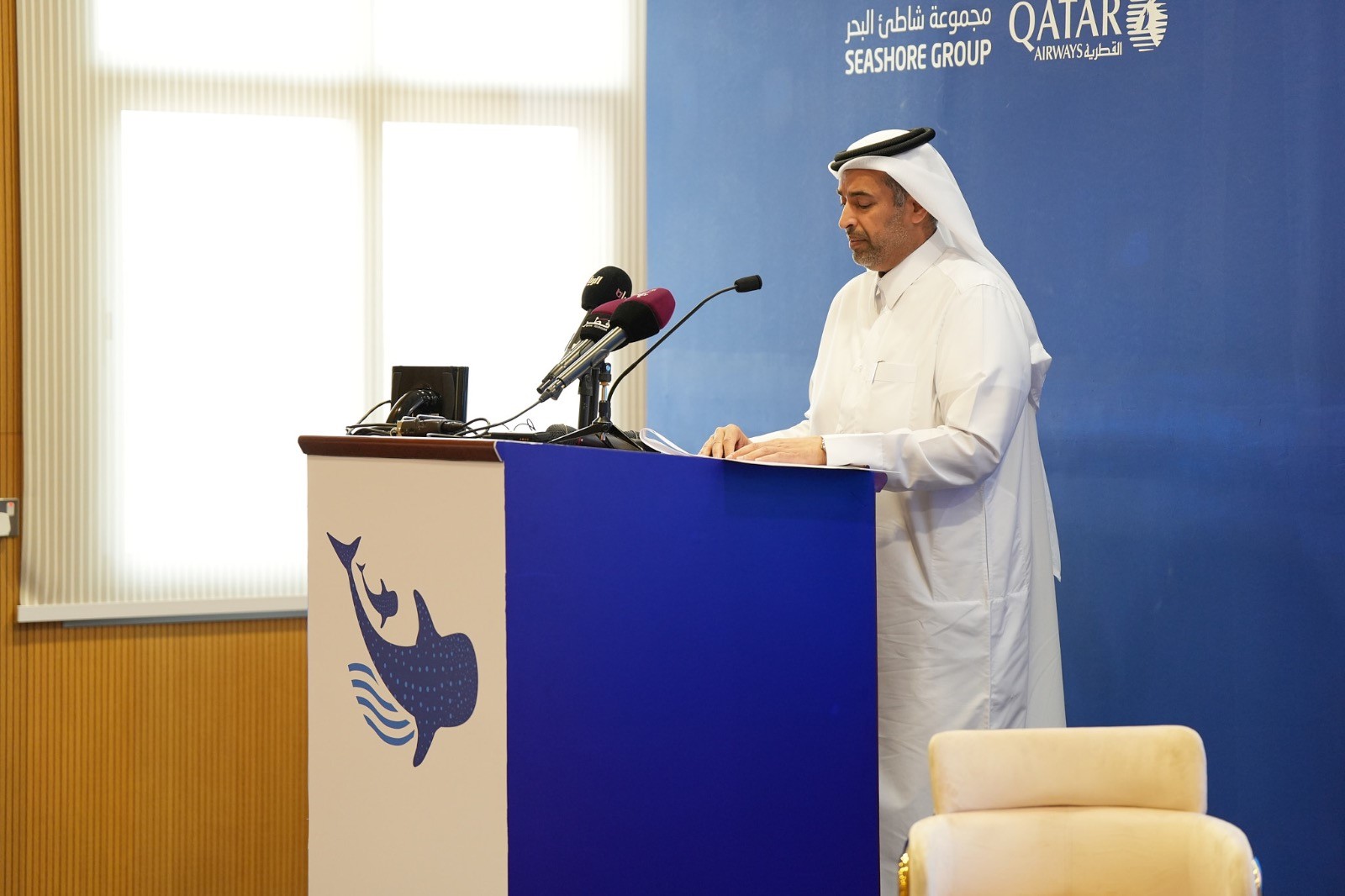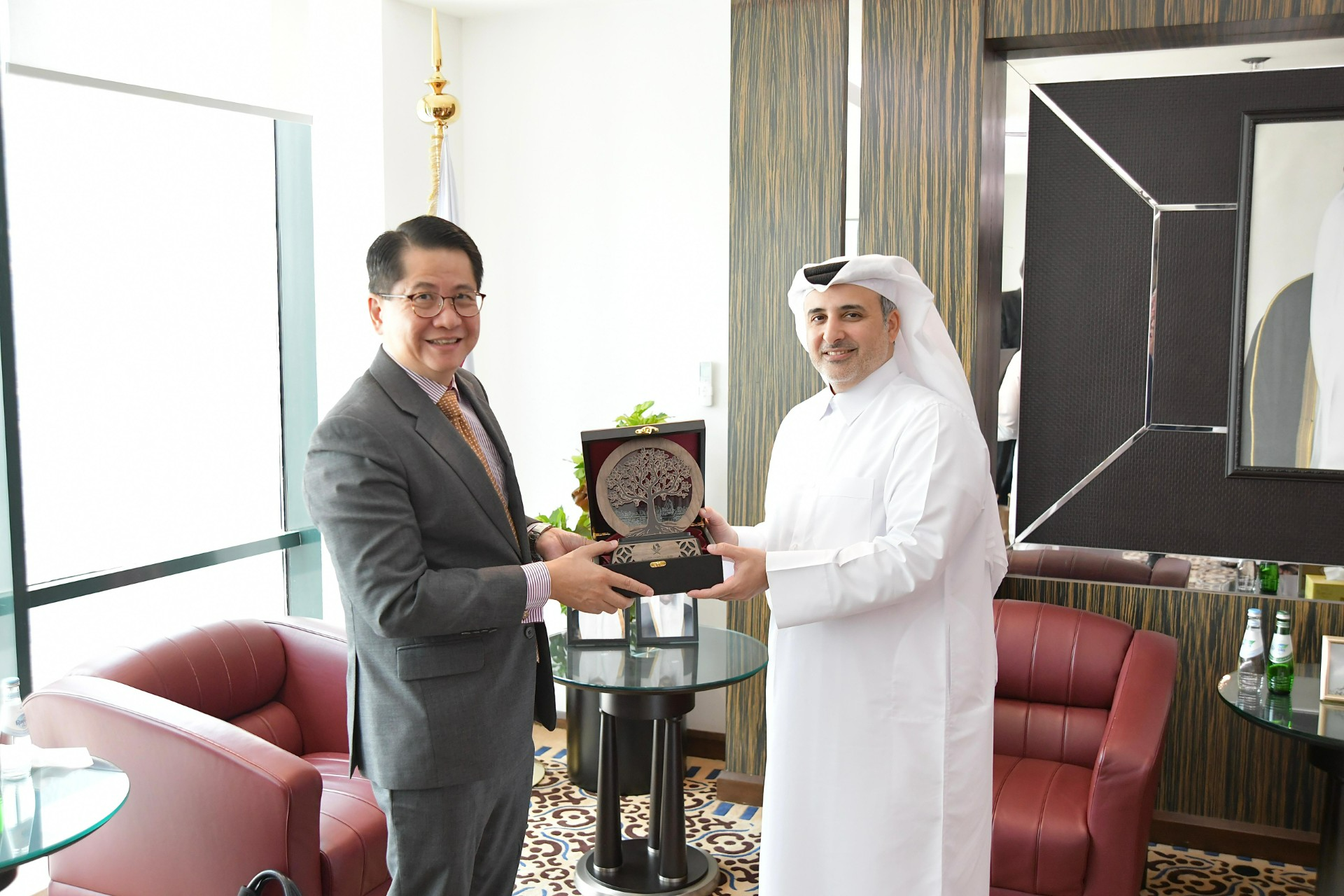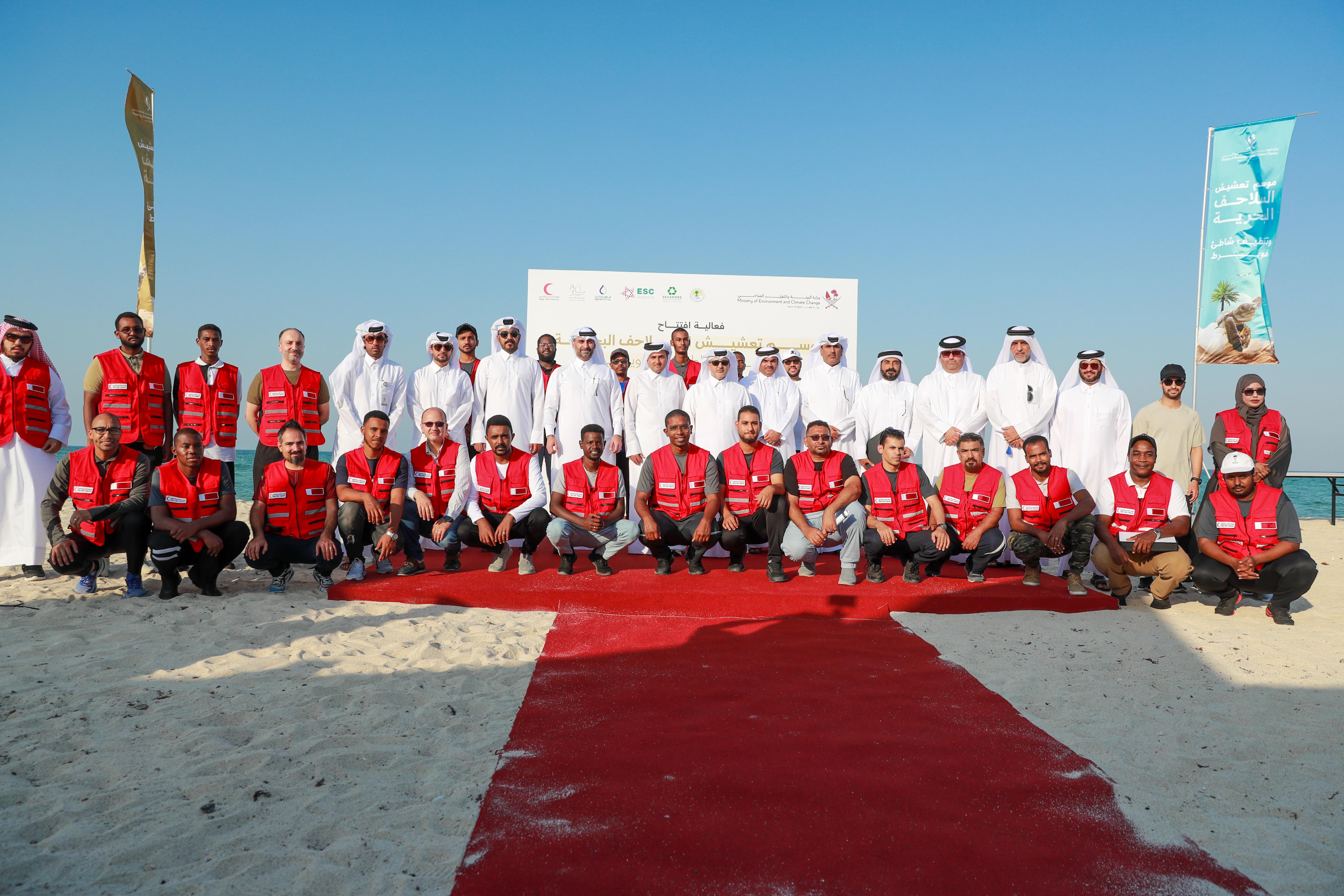
The launch of the Qatar Forum for Whale Shark Conservation, organized by the Ministry of Environment and Climate Affairs, took place today
The Qatar Forum for Whale Shark Conservation 2023, organized by the Ministry of Environment and Climate Change in partnership with the United Nations Educational, Scientific and Cultural Organization (UNESCO), kicked off this morning. The forum will take place from May 22nd to May 23rd at the Marine Biology Research Center in the Ras Matbakh area, northern Qatar.
On the first day of the forum, three main sessions were held, during which 18 research papers were presented. More than 11 local, regional, and international experts and researchers participated in these sessions. The papers discussed various topics related to whale shark conservation, including factors affecting their lives, the risks they face, and studies on their migration patterns in seas and oceans. The research presentations also covered modern techniques used to track their movements.
In his opening speech at the forum, His Excellency Sheikh Dr. Faleh bin Nasser Al-Thani, the Minister of Environment and Climate Change, emphasized that organizing the forum stems from the ministry’s responsibilities in collaboration with the international community to protect the environment. It also reflects the state’s active role in preserving the marine environment and its significant biodiversity. He mentioned that the Ministry of Environment and Climate Change aims to hold the forum periodically in coordination with relevant international and regional entities. He highlighted the importance of preserving all forms of marine life and working towards their protection, as this plays a significant role in maintaining the environmental balance in the seas and oceans, benefiting all inhabitants of the Earth.
He also discussed the state’s vision over the past years, stating, “We have launched the National Strategy for Environment and Climate Change 2030. We have also worked on developing the Qatari National Action Plan for the Conservation and Management of Marine Resources, as well as preparing maps for coastal areas and ecologically important benthic habitats. Additionally, we have updated and issued legislation and laws that protect the marine environment and criminalize harm to its biodiversity. Furthermore, we have been working to increase the area of marine protected areas to 30% of Qatar’s exclusive economic zone.”
Furthermore, His Excellency Sheikh Dr. Faleh bin Nasser Al Thani emphasized that, as part of Qatar’s commitment to achieving its National Vision 2030, particularly in relation to the fourth pillar concerning environmental development, the ministry has conducted research and studies related to biodiversity. Among these studies is one conducted since 2010, focusing on whale shark areas, under the supervision of a group of scientists and experts. The study documented the intensive presence of whale sharks in Qatar and revealed that Qatari territorial waters host one of the largest aggregations of these sharks, particularly in the Shahin field in the northeastern region of the country.
He also mentioned that the average number of whale sharks, according to important statistics, has reached approximately 600 whale sharks. He pointed out that this is the highest documented number worldwide. Additionally, valuable information has been gathered about the lifestyle patterns of these creatures and their surrounding environment. This information has provided the necessary infrastructure for developing conservation plans and ensuring the preservation of their lives within Qatari territorial waters.
His Excellency the Minister of Environment and Climate Change emphasized the importance of convening such regional forums, which serve as a platform for consultation among regional and international partners to highlight international efforts to protect marine biodiversity. These forums facilitate knowledge transfer, exchange of opinions, ideas, and perspectives through discussion sessions and research papers presented. He noted that this forum supports the coordination of efforts among partners, contributing to the development of a shared vision regarding the key challenges and risks facing this rare species of whales.
He highlighted the importance of collaborative work in developing solutions, recommendations, and making appropriate decisions to protect these species from risks and challenges. This collective effort aims to achieve the shared goal of conserving whale sharks as they are important natural assets.
In addition, His Excellency Sheikh Dr. Faleh bin Nasser Al Thani clarified that there is a study underway to establish a regional office for whale sharks in Qatar. This initiative is part of Qatar’s efforts to preserve whale sharks and complements the Ministry’s long-standing endeavors in marine biodiversity conservation. The establishment of such an office aims to enhance the region’s capacity to protect these animals and develop an ambitious roadmap that aligns with sustainability efforts and regional initiatives to conserve and protect marine life within our regional waters.
Furthermore, His Excellency the Minister of Environment and Climate Change extended his gratitude to all the entities, partners, and supporters of this forum. He specifically mentioned UNESCO, the strategic partner university, Qatar University, Qatar Airways, and Seashore Recycling and Sustainability Company, along with all the participants. He expressed his hope that this regional forum would be held on an annual basis, aiming to unify efforts, foster collaboration, and build an effective strategy to preserve whale sharks in the region.
Ms. Farida Aboudan, an Education Program Specialist at the UNESCO Office for the Gulf States and Yemen, affirmed that the forum coinciding with the International Day for Biological Diversity serves as a reminder of the importance of preserving biodiversity, including the conservation of whale sharks.
During her speech at the forum’s opening, she emphasized that whale sharks hold a significant position in our natural world due to their unique characteristics. However, she warned of the challenges that threaten their survival, such as the destruction and degradation of their important habitats, the impact of climate change on marine ecosystems, and the effects of pollution, including plastic waste, chemical runoff, and oil spills.
Ms. Farida Aboudan also pointed out that a lack of awareness about the importance of whale sharks poses a threat and hinders conservation efforts. She highlighted the fruitful discussions between UNESCO and the Ministry of Environment and Climate Change, aiming to build a strong partnership to effectively address these challenges. This collaboration seeks to enhance protection and conservation efforts for whale sharks, ensuring their long-term survival and the preservation of their vital ecosystems.
She further explained that the joint efforts encompass research, scientific collaboration, capacity building, education, and public awareness. She emphasized the importance of leveraging UNESCO’s international expertise and supporting Qatar’s initiatives to protect its natural heritage and enhance sustainable practices. She cited examples such as the Man and the Biosphere (MAB) program and UNESCO’s World Heritage Marine programs, which provide significant support for the conservation of marine ecosystems and their fragile habitats.
The UNESCO education program specialist highlighted that the joint initiative between UNESCO and the Ministry of Environment and Climate Change aligns perfectly with the United Nations Decade of Ocean Science for Sustainable Development (2021-2030), also known as the Ocean Decade. The Ocean Decade aims to enhance and develop the scientific knowledge necessary to understand, protect, and sustainably manage our oceans, their resources, and their ecosystems.
She emphasized the importance of ability building and education in promoting sustainable practices. She highlighted that such programs enhance the skills and knowledge of stakeholders, enabling them to adopt responsible tourism practices and sustainable fishing methods, ensuring the long-term health of whale shark populations and their habitats. She pointed out that the partnership between UNESCO and the Ministry of Environment and Climate Change serves as a strong platform for knowledge exchange and sharing best practices, research findings, and protection strategies with neighboring countries and abroad.
Mrs. Farida Aboudan highlighted the interconnectedness of the environmental systems along the migratory pathways of whales, including feeding areas, breeding grounds, and migration corridors. She emphasized that any threats to these habitats in one location can have long-term impacts on their survival and preservation. Therefore, it is essential to adopt a collaborative approach that transcends national boundaries.
The education program specialist concluded by emphasizing UNESCO’s appreciation for the ongoing discussions with the Ministry of Environment and Climate Change, highlighting the organization’s commitment to working towards the protection of Qatar’s magnificent natural heritage and looking forward to positive outcomes based on this partnership.
At the end of the ceremony, His Excellency Sheikh Dr. Faleh bin Nasser Al Thani, the Minister of Environment and Climate Change, honored the participating entities and sponsors. The honors included the representative of UNESCO as a strategic partner, Qatar Airways as the official sponsor, and Seashore for Recycling and Sustainability as the bronze sponsor. Additionally, the engineer Azam Al Mannai, a photographer and wildlife enthusiast, was recognized for his participation and exhibition of his artwork during the forum.
The Whale Shark Forum covers several main topics, including discussing ways to preserve whale sharks and promote their growth in all participating countries, understanding the key challenges facing these endangered species in general, and identifying the best approaches to overcome them.
The forum also aims to bring stakeholders together under one roof to discuss various topics related to whale sharks, increase awareness about the importance of protecting them, enhance cooperation and partnerships among participants, and explore ways to develop a regional strategy for the conservation of whale sharks.


